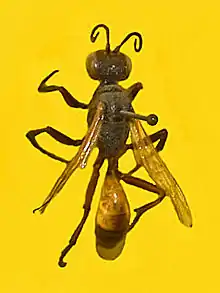| Podalonia hirsuta | |
|---|---|
 | |
| Podalonia hirsuta . Museum specimen | |
| Scientific classification | |
| Domain: | Eukaryota |
| Kingdom: | Animalia |
| Phylum: | Arthropoda |
| Class: | Insecta |
| Order: | Hymenoptera |
| Family: | Sphecidae |
| Genus: | Podalonia |
| Species: | P. hirsuta |
| Binomial name | |
| Podalonia hirsuta (Scopoli, 1763) | |
| Synonymsref name = GBIF>"Synonyms for "Podalonia hirsuta"". GBIF.org. Retrieved 22 May 2017.</ref> | |
| |
Podalonia hirsuta is a species of parasitoidal wasps in the family Sphecidae.[1][2]
Subspecies
- Podalonia hirsuta hirsuta (Scopoli, 1763)
- Podalonia hirsuta mervensis (Radoszkowski, 1887)
Description
Podalonia hirsuta is similar to the sand wasps (Ammophila). It has a big black head, a black thorax, with a threadlike waist (petiole). The abdomen is black with a red-orange large band.
The females make their nests digging a burrow in a sandy area. The preys are generally large, hairless caterpillars of moths (Noctuidae). In the paralysed caterpillars they lay their eggs. [3]
Flight period extends from late March to mid-September in females, while males fly from June to September.[3]
Distribution and habitat
This species is present in most of Europe.[4] This mainly coastal species commonly can be found in sandy soils.[3]
References
This article is issued from Wikipedia. The text is licensed under Creative Commons - Attribution - Sharealike. Additional terms may apply for the media files.